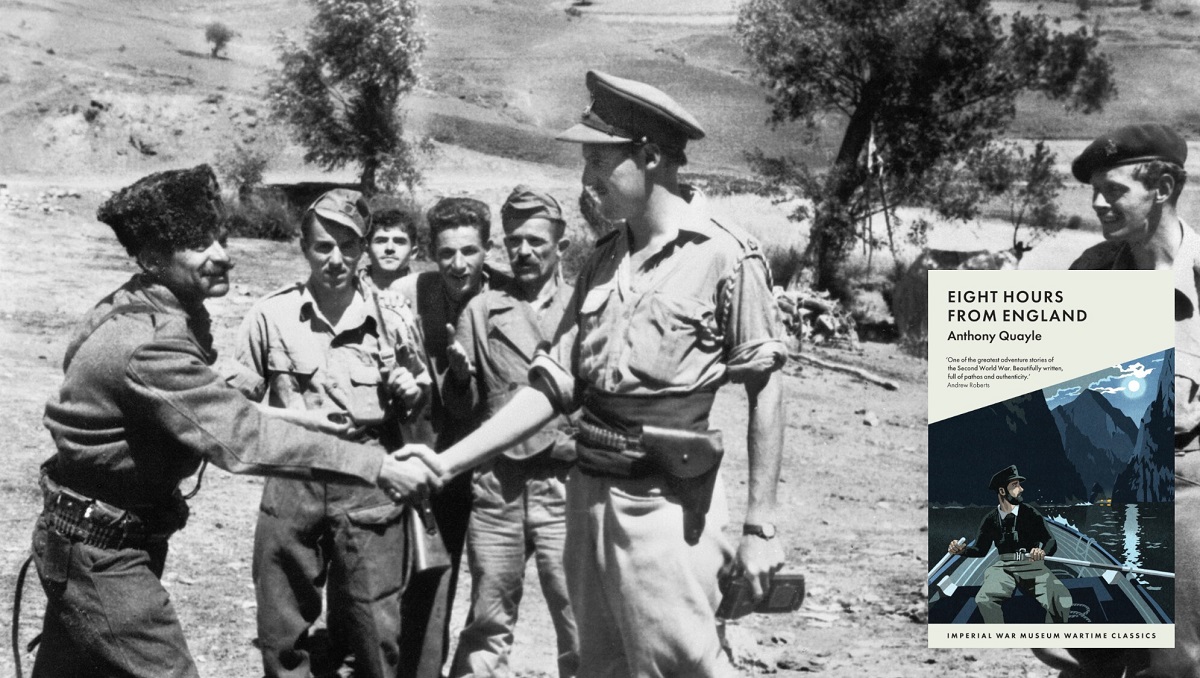
Without fully knowing the mission requirements, Overton volunteers and sets himself on a path towards service behind enemy lines in Europe.
Eight hours from England, while fiction, is based on author Anthony Quayle’s experiences working for the Special Operations Executive (SOE) in the Balkans during World War II. Anthony Quayle is remembered less for his writing than for his acting, with classics such as The Guns of Navarone and Lawrence of Arabia on his cinematic resume. Originally published in 1945 but recently reissued as part of the Imperial War Museum Wartime Classics series, Quayle’s work was among the first published by former SOE operatives following the war. Potentially surprised by its initial reception, the author noted later that “it was well enough received to make me wonder if I should turn to writing instead of acting.” While not a memoir, Eight Hours from England serves as a lightly fictionalized account of Quayle’s own experiences; set in 1944 Nazi-occupied Albania, it first and foremost highlights the challenges of working with proxies/indigenous forces—particularly the importance of understanding intra-conflict politics.
The wartime experiences of the protagonist, John Overton, mirror those of the author with only minor changes. On leave in London following an uneventful first tour on Gibraltar, Overton is rebuffed by a love interest and becomes listless. Seeking a way to more actively contribute to the war effort (as well as a way to partake in something more exciting than service on Gibraltar), Overton takes up a friend on an offer to commit to an exciting but mysterious assignment. Without fully knowing the mission requirements, Overton volunteers and sets himself on a path towards service behind enemy lines in Europe.
Following parachute training in Italy, the protagonist finds himself en-route to Nazi-occupied territory to work with local resistance forces. Overton learns that he is to be sent to Albania where his lack of experience and understanding of the culture is seen as a plus by headquarters as he’ll have “no political bias” going into a complicated situation. Once his training is complete, Overton is infiltrated to replace an injured officer with an admonishment: “don’t forget your main task is to kill Germans.” That statement—which seems odd given the setting—foreshadows that the challenges to come will be equal parts enemy-based and partner-based.
Overton’s experiences mirror the real-life accounts of many SOE agents (and Office of Strategic Services (OSS) operatives for the Americans) whose duty was tied to working with resistance forces. After arriving in his area of operations via the Albanian coast, Overton integrates with the combined U.S.-UK team working with local forces in that area. Arriving essentially ignorant of the local political dynamics, Overton is almost immediately beset by the issues that can come with working with local resistance elements. Overton faces three primary challenges—understanding local dynamics, a principal-agent problem, and alliance issues.
The first element of Overton’s challenge is the infighting between Albanian resistance elements—the communist partisans, and the pro-fascist or right leaning Balli—that characterized the local dynamics of the war in that area. Most of the Allied leadership had already established opinions regarding who should be the priority for support; those previously or currently embedded with a particular group likely favored one over the other. Quayle has his protagonist describe the situation: “An officer attached to the Partisans was very apt to regard the Balli, as the Right Wing party was called, as a gang of neo-Fascists; the officer who had connections with the Balli saw in the Partisans nothing but the cunning and bloody agents of world bolshevism.” To combat this, Overton resolves to go into Albania without being influenced by other opinions, however, this attempt at objectivity results in his being “not only unbiased but almost completely ignorant of the problems that faced me.”
With the partisans and the Balli each focused on their own divergent strategic aims, Overton finds himself cajoling each group to fight the Germans as opposed to each other.
Rather than arriving to train and lead a guerilla force keen to unite and fight their Nazi occupiers, Overton wades into a principal-agent problem split three ways. While a principal-agent problem can apply to risk-sharing scenarios ranging from economics to the law, when used to describe proxy warfare it typically refers to the challenges facing interest alignment—specifically, that the principal is likely taking less physical risk than the agent, but still endeavors to have his or her interests realized. With the partisans and the Balli each focused on their own divergent strategic aims, Overton finds himself cajoling each group to fight the Germans as opposed to each other. As a result, the relationships between the Allied special operations team and their Albanians partners is often transactional at best. With some characters concerned about the spread of communism from Albania into Italy following a potential partisan-led victory, it becomes difficult to separate pragmatism from subjective perspectives in a war of this character. Notably, when the Allied team tries to convince a Ballist leader to separate himself from the Germans, he openly tells the team that he knows the United States and England will not be Albania after the war, and that he fears that the communists will become too strong if the two elements cooperate in the short-term against the Nazis. Instead, he openly tells Overton that “I will use the Germans, who are now in Albania, as a weapon with which to destroy the communists.”
The third component of Overton’s challenge can be characterized as a microcosm of alliance dynamics. Coalition warfare is famously difficult for a variety of reasons, with the ultimate challenge being interest alignment between Allies. Working side by side in a stressful and high-stakes situation, our British protagonist finds himself at odds with his American comrades. While one part of the team is focused on gathering intelligence, the other is focused on sabotage and directly engaging the Germans. As one of the veterans points out, it isn’t very productive to destroy a bridge that is the only means by which an intelligence asset can be accessed. This dissent, or lack of a unified front, complicates an already difficult situation, and is an additional, unexpected challenge to Overton’s leadership.
Overton ends up fighting against literal partisan politics—local dynamics, principal-agent problems, and alliance issues–more than the Germans. On top of all of these problems, the constant threats of equipment theft, the elements, betrayal, and discovery of his guerilla camp, plague him and compatriots—all while they’re still attempting to complete their mission. Eight Hours from England serves as a reminder that working with proxies requires both cultural awareness and cultural understanding—a graduate level understanding of the intersection of language, regional politics, history, and local drivers of conflict. The challenges that Overton experiences may seem familiar to anyone who has worked with partner forces. Local dynamics, interest alignment, and alliance dynamics are of course not unique to the Second World War. Proxy wars appear again and again in history, making Eight Hours from England a useful read for students of history looking to think about the unchanging nature of war. As evidenced by Overton’s struggles, there is no replacement for knowledge of the local situation, if not outright regional expertise. It may well be worthwhile for a modern Overton to spend as much time understanding historical local grievances as planning potential combat operations. In the end, understanding one’s strategic aims must be the driver for the decisions made at the tactical and operational level, whether it is prioritizing one group over another, target selection, or post-war promises. While it is a fictionalized account of one man’s experience, there are enduring lessons in Quayle’s overlooked novel that may stay with the modern practitioner.
Rick Chersicla is an Army Strategist currently serving in a joint headquarters in Europe.
The views expressed in this article are those of the author and do not necessarily reflect those of the U.S. Army War College, the U.S. Army, or the Department of Defense.
Photo Description: Service of Major David Smiley With the Special Operations Executive (soe) in Albania, 1943 – 1944. Xhelal Staravecke shaking hands with Major Billy McLean at Shtylla, August 1943 during the first SOE mission to Albania. Behind them are Stilian and Stephan and, on the right, Major Peter Kemp.
Photo Credit: Colonel David Smiley from the collections of the Imperial War Museums




